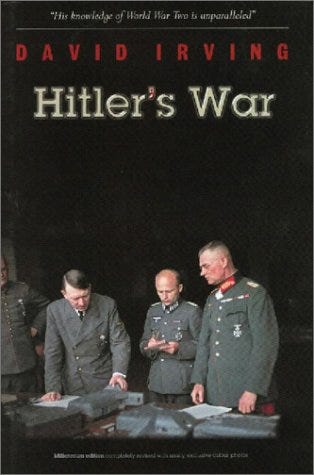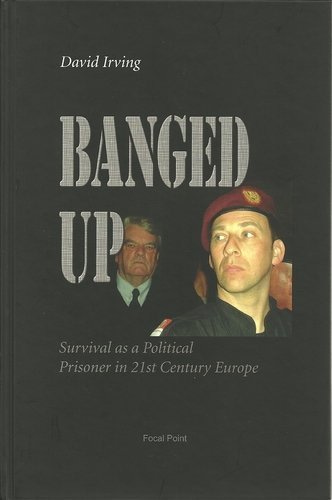The Trials of David Irving
on the topic that can't be questioned
In this video I’ll look at a history of David Irving, author of Hitler’s War and 30 other books that have sold millions of copies, making him perhaps, at 80, the most internationally read British historian of the last century. And bankrupted. And left in solitary confinement for a year, and barely escaping confinement for the rest of his life. I’ll be referenced Ron Unz, once again, in The Remarkable Historiography of David Irving and in Why Everything You Know About WWII is Wrong.
Why am I continuing to research the silenced historians of WWII when there’s so much exploding in flames all around us? The intrepid Ratio Bradbornius writes:
The world government thing was a long plan. In the US the Federal Reserve Act was followed by World War 1 and the league of nations. It failed. Then there was the great depression followed by the Hitler, the Nazis and World War 2. You guessed it, the United Nations was formed after they blew the fuck out of Japan with nuclear weapons.
By the way, they can’t fucking stop talking about WWII even though there have been countless wars and genocides since. That means WWII is one of the biggest psyops of all time because literally all the narratives that come out of it justify our current world.
I want to take a closer look at that. What is the overarching narrative of WWII? I would say it’s “People can’t be trusted.” Within each of us lurks a monster, a weak-willed conformist at best and a genocidal murderer at worst. Selfishness is human nature. Even when people seem perfectly reasonable, perfectly nice, it’s just a front.
Would it really be such bad news if this were not true? If it were, in fact, the reverse: people don’t need overlords to keep their ever-simmering hatred and violence in check. It’s the overlords who’ve told us we can’t trust each other. And then, to prove it, they funded leaders on both sides. And controlled both media. Wrote propaganda in both languages. Designed the revolution and the counter-revolution.
To challenge the existing narrative of WWII is considered anti-Semitic. But the existing narrative is anti-Germanic. If this narrative was not true, it would give Germans back their integrity as a people. Is that horrifying? Why can we not mention historical data that may incriminate some members of one race but can’t question the collective damnation of an entire other?
As a citizen of the United States, I see it as my responsibility to understand the truth about what’s done to other people ‘in my name.’ I think that those who identify as Jews have a responsibility to find out what really happened in WWII. It is not ‘Jewish activists’ who bomb a printer to prevent publication of a historical text, it’s Jewish terrorists. It’s not ‘Jewish activists’ who forced universities to fire historians or publishers to revoke book deals or venues to refuse speaking engagements. These are acts of intimidation. And the governments who imprison and fine authors aren’t protecting Jews from violence, they’re committing violence to protect secrecy.
Ron Unz describes Irving as:
… regularly deploying his remarkable command of the primary source documentary evidence to totally demolish my naive History 101 understanding of major historical events. It would hardly surprise me if the huge corpus of his writings eventually constitutes a central pillar upon which future historians seek to comprehend the catastrophically bloody middle years of our hugely destructive twentieth century even after most of our other chroniclers of that era are long forgotten.
Carefully reading a thousand-page reconstruction of the German side of the Second World War is obviously a daunting undertaking, and his remaining thirty-odd books would probably add at least another 10,000 pages to that Herculean task. ….
When confronted with astonishing claims that completely overturn an established historical narrative, considerable skepticism is warranted, and my own lack of specialized expertise in World War II history left me especially cautious. The documents Irving unearths seemingly portray a Winston Churchill so radically different from that of my naive understanding as to be almost unrecognizable, and this naturally raised the question of whether I could credit the accuracy of Irving’s evidence and his interpretation. All his material is massively footnoted, referencing copious documents in numerous official archives, but how could I possibly muster the time or energy to verify them?
Rather ironically, an extremely unfortunate turn of events seems to have fully resolved that crucial question.
Unz then writes how in the ‘80’s and ‘90’s, Jewish ‘activists’ had pressured Irving’s publishers to drop his books, disrupted his speaking tours, lobbied countries to deny him entrance, and labelled him a ‘Nazi’ and ‘Hitler-lover.’ This was sometimes “backed by considerable physical violence.” This succeeded in destroying his ability to reach an audience with his books.
Then Deborah Lipstadt attacked him in her 1993 book Denying the Holocaust, causing his publisher to rescind the contract for the major historical volume he was working on. In 1996, Irving sued Lipstadt and Penguin books for libel in the British court, where her book had since been published. It went to trial before a judge in 2000. Unz writes:
That legal battle was certainly a David-and-Goliath affair, with wealthy Jewish movie producers and corporate executives providing a huge war-chest of $13 million to Lipstadt’s side, allowing her to fund a veritable army of 40 researchers and legal experts, captained by one of Britain’s most successful Jewish divorce lawyers. By contrast, Irving, being an impecunious historian, was forced to defend himself without benefit of legal counsel.
… their lavishly-funded corps of researchers and fact-checkers … spent a year or more apparently performing a line-by-line and footnote-by-footnote review of everything Irving had ever published, seeking to locate every single historical error that could possibly cast him in a bad professional light. With almost limitless money and manpower, they even utilized the process of legal discovery to subpoena and read the thousands of pages in his bound personal diaries and correspondence, thereby hoping to find some evidence of his “wicked thoughts.” Denial, a 2016 Hollywood film co-written by Lipstadt, may provide a reasonable outline of the sequence of events as seen from her perspective.
Yet despite such massive financial and human resources, they apparently came up almost entirely empty, at least if Lipstadt’s triumphalist 2005 book History on Trial may be credited. Across four decades of research and writing, which had produced numerous controversial historical claims of the most astonishing nature, they only managed to find a couple of dozen rather minor alleged errors of fact or interpretation, most of these ambiguous or disputed. And the worst they discovered after reading every page of the many linear meters of Irving’s personal diaries was that he had once composed a short “racially insensitive” ditty for his infant daughter, a trivial item which they naturally then trumpeted as proof that he was a “racist.” Thus, they seemingly admitted that Irving’s enormous corpus of historical texts was perhaps 99.9% accurate.
I was curious as to what those ‘errors of fact or interpretation’ were so I looked up the trial on Wikipedia, so there could be no question of bias—at least in favor of Irving. It recounts that Lipstadt first encountered Irving when he showed up at her lecture with a handful of money offering $1000 to anyone who could find a written order from Hitler for the Holocaust. She ignored him and there were no takers.
Her book called him a Holocaust denier and falsifier, a bigot, and said he manipulated and distorted real documents. In American courts, the burden of proof is on the person suing to show that the statements are false and defamatory, and made with malice and reckless disregard for the truth. In British court, the burden of proof is on the defendant to show their statements are true. These claims were defined as follows:
that Irving is an apologist for and partisan of Hitler, who has resorted to the distortion of evidence; the manipulation and skewing of documents; the misrepresentation of data and the application of double standards to the evidence, in order to serve his own purpose of exonerating Hitler and portraying him as sympathetic towards the Jews;
that Irving is one of the most dangerous spokespersons for Holocaust denial, who has on numerous occasions denied that the Nazis embarked upon the deliberate planned extermination of Jews and has alleged that it is a Jewish deception that gas chambers were used by the Nazis at Auschwitz as a means of carrying out such extermination;
that Irving, in denying that the Holocaust happened, has misstated evidence; misquoted sources; falsified statistics; misconstrued information and bent historical evidence so that it conforms to his neo-fascist political agenda and ideological beliefs;
that Irving has allied himself with representatives of a variety of extremist and anti-Semitic groups and individuals and on one occasion agreed to participate in a conference at which representatives of terrorist organisations were due to speak;
that Irving, in breach of an agreement which he had made and without permission, removed and transported abroad certain microfiches of Goebbels's diaries, thereby exposing them to a real risk of damage;
that Irving is discredited as an historian.
On the question of Irving as a historian, Cambridge professor Richard Evans was the lead witness. He and two associates spent over two years combing through Irving’s work and concluded:
Not one of [Irving's] books, speeches or articles, not one paragraph, not one sentence in any of them, can be taken on trust as an accurate representation of its historical subject. All of them are completely worthless as history, because Irving cannot be trusted anywhere, in any of them, to give a reliable account of what he is talking or writing about. ... if we mean by historian someone who is concerned to discover the truth about the past, and to give as accurate a representation of it as possible, then Irving is not a historian.
What was the evidence that Irving distorted? Irving cites a 1942 memo by the Chief of the Reich Chancellery, where he said that Hitler wanted the “Jewish Question put on the back-burner” until after the war. Evans said Hitler may have said that but didn’t mean it literally. When Irving points to the many times Hitler and German officials talked about “resettlement in the East,” another witness “insisted quite firmly that the term "resettlement" was only a euphemism for extermination and nothing more.”
A third witness “countered Irving's argument that the lack of a written Führer order proves the alleged non-occurrence of the Holocaust by arguing that, although no such order was ever written down, Hitler had almost certainly made statements to his leading subordinates indicating his wishes in regards to the Jews of Europe during the war, thus rendering the need for a written order irrelevant.” (emphasis mine)
As Irving retorted, “it is a terrible problem, is it not, that we are faced with this tantalizing plate of crumbs and morsels of what should have provided the final smoking gun, and nowhere the whole way through the archives do we find even one item that we do not have to interpret or read between the lines of, but we do have in the same chain of evidence documents which... quite clearly specifically show Hitler intervening in the other sense?”
The judge’s ruling concluded: “Irving has for his own ideological reasons persistently and deliberately misrepresented and manipulated historical evidence; that for the same reasons he has portrayed Hitler in an unwarrantedly favourable light, principally in relation to his attitude towards and responsibility for the treatment of the Jews; that he is an active Holocaust denier; that he is anti-Semitic and racist, and that he associates with right-wing extremists who promote neo-Nazism ... therefore the defence of justification succeeds … It follows that there must be judgment for the Defendants.”
In 2005, C-Span did a Book Review of History on Trial, Deborah Lipstadt’s triumphant book that was later made into a movie. Lipstadt refused to allow C-Span to film her lectures, saying that would turn it into a debate. Instead they interviewed T.R. Reid from the Washington Post, who viewed Irving as pathetic:
“I don’t know why David Irving brought this suit, he was doomed to lose on day one. … If you look at the dynamic of British society there was no way in the world that Justice Gray, a senior respected member of the British bar, was going to say the Holocaust didn’t happen. It just wasn’t a winner from the beginning…. I don’t know that Irving cared. His life as a historian was wrecked already. … I felt from day one there was no way Irving could win this case. There’s no way that a British court would have said that this distinguished American professor is wrong in saying the Holocaust occurred and Hitler knew about it.”
Reid, who mentions several times the ‘proper’ attire of the wigged judge and barrister vs Irving representing himself in his one suit, gives an example of Irving’s cluelessness. At one point he brings up how Anne Frank’s Diary was written in a type of ink that didn’t exist in WWII. The barrister gets up in his powdered wig and says, “Really, my lord, really, I really do think this is becoming the most frightful waste of time.” And the judge says, “At least this time it’s relevant,” and they have a good laugh.
So the question of whether The Diary of Anne Frank is a forgery is ‘a frightful waste of time’, however Irving is a liar who distorts historical statements because he takes them literally rather than as euphemisms. That and a ‘racially insensitive ditty for an infant’ is the most damning evidence $13M could buy in examining over 10,000 pages, according to the ‘impartial’ Wikipedia.
As a result, although Lipstadt states she refused payment, Irving was charged with court costs between 1 and 2 million pounds and had to sell his home in central London and declare bankruptcy with his wife and disabled daughter. Four years later, on a quick trip to Austria, he was arrested for statements made 16 years earlier. Unz writes:
Initially, his arrest was kept secret and he was held completely incommunicado; for his family back in Britain, he seemed to have disappeared off the face of the earth, and they feared him dead. More than six weeks were to pass before he was allowed to communicate with either his wife or a lawyer, though he managed to provide word of his situation earlier through an intermediary.
And at the age of 67 he was eventually brought to trial in a foreign courtroom under very difficult circumstances and given a three-year prison sentence. An interview he gave to the BBC about his legal predicament resulted in possible additional charges, potentially carrying a further twenty-year sentence, which probably would have ensured that he died behind bars. Only the extremely good fortune of a successful appeal, partly on technical grounds, allowed him to depart the prison grounds after spending more than 400 days under incarceration, almost entirely in solitary confinement, and he escaped back to Britain.
His sudden, unexpected disappearance had inflicted huge financial hardships upon his family, and they lost their home, with most of his personal possessions being sold or destroyed, including the enormous historical archives he had spent a lifetime accumulating. He later recounted this gripping story in Banged Up, a slim book published in 2008, as well as in a video interview available on YouTube.
Some bullet points I derived from Unz:
In the three most famous accounts of WWII by General Eisenhower, Winston Churchill and General de Gaulle, totaling over 7000 pages, “one will find no mention either of Nazi “gas chambers,” a “genocide” of the Jews, or of “six million” Jewish victims of the war.”
For two decades after WWII, the word ‘Holocaust’ referred to nuclear holocaust and there was no public discussion of a genocide of European Jews.
“… during the Second World War itself, few mainstream individuals in the political or media worlds had apparently believed in the reality of the ongoing Holocaust, mostly regarding the widespread stories being promoted by Jewish activists and Allied governments as merely dishonest wartime propaganda.”
A 1961 book by Raul Hilberg, who had been a child when his family of Jewish refugees arrived in America at the beginning of the war, formed the modern understanding of the Holocaust and sparked numerous Holocaust memoirs, “though some of the most prominent turned out to be fraudulent.”
In 16 countries it’s now illegal to question the details of the Holocaust.
And I will conclude by saying that I’ve lost some respect for Max Blumenthal of The Greyzone after watching a video where he corners Irving in a church basement lecturing to a handful of people. After showing a quavering priest whimpering, “I didn’t know who he was when I rented to him,” he accosts Irving and says, “Are you a Holocaust denier?” When Irving says he doesn’t use that term, Blumenthal repeats, “But are you a Holocaust denier?”
‘Holocaust-denier’ is like anti-vaxxer, conspiracy theorist or ex-wife-beater. Rather than weighing the evidence for or against specifics, it puts the accused in an impossible position. They either are guilty as charged or they’re arguing for the other side—no, I’m not a holocaust denier, anti-vaxxer, conspiracy theorist or ex-wifebeater. “See, you agree with me that you beat your wife!” From the time this trial was framed, as Reid admits, there was literally no way in which Irving could win.
And here are the previous two: Unz, Corbett & the Unnecessary War:
James Corbett and Keith Knight give 10 lessons from Churchill, Hitler & the Unnecessary War by Pat Buchanan. Ron Unz covers the same in American Pravda: Understanding WWII, and talks about prominent historians 'disappeared' from history for writing about it. The real history is shocking!
and Churchill’s Atrocities:
Did you know that Churchill initiated bombing of civilian cities? Or was paid huge bribes by foreigners? That he wanted to use nerve gas and even drop anthrax bombs? Or that a gambling loss on the US stock market was bailed out in exchange for war? And that FDR referred to him as a drunken bum? Ron Unz cites historians from the 1930's to the present to change your image of Churchill forever.







Whoa! Although I've long had some superficial doubts about the 'heroic' image of Churchill as opposed to a nuanced and flawed human being ... this takes us down a much deeper, darker rabbit hole. Increasingly feeling that I've spent most of my life in a matrix.
Interesting. "Hitler's War" is not available in English at Amazon Japan. But there is a Japanese translation. When I went to Amazon U.S., I found both the hard-bound and paperback English versions ... either at just under a $100.00 pay wall.
Hoisting my sails and changing tack, I found this ... https://prussia.online/Data/Book/hi/hitler-s-war-and-the-war-path/Irving%20J.%20Hitler%27s%20War%20and%20the%20War%20Path%20(2002),%20OCR.pdf
p.s. Thanks to Kathleen, there is one quote I'd like to hedge, if for no other reason than my hedge would include the likes of us.
“People can’t be trusted.” Within each of us lurks a monster, a weak-willed conformist at best and a genocidal murderer at worst. Selfishness is human nature. Even when people seem perfectly reasonable, perfectly nice, it’s just a front."
After reading Lobaczewski's book on Political Ponerology, and reflecting on how much of the 'bad luck' of my last 40 years in Japan could be attributed to embedded racism, and how much can be attributed to general human nature, I've gradually come to think of part of human nature as the following:
Although we are biologically of the same species, we are each unique enough so that if we can imagine a bell curve for some kind of moral continuum, yes ... there will be Cluster B, dark-tetrad type monsters ... the pathological narcissists, machiavellian opportunists, morphologically defined psychopaths, and sadists ... among us. I've read papers estimating the percent of any given general population to be anywhere between 3 and 15% ... with some professions such as CEOs, attracting roughly 10 times that number. But if, like most other variables, our genetic predispositions (epigenetics and trauma add much more complexity to this) fall on a moral bell-curve, those monsters are at one end of the curve with a few extreme outliers as well. But there is the opposite end of the curve. I would like to think of them as altruistic to the point of self-sacrifice for the sustainability of the community. The heroes among us.
At a Japanese college, I once taught a graduation seminar based on part of Joseph Campbell's "Power of Myth" series ... "The Hero With a Thousand Faces". As it was a Women's College, I emphasized one of the salient examples that Campbell used ... the act of birthing and sucessfully nurturing a child to autonomy demands of the 'girl' to grow into a woman, both physically and morally. The same could be said of a man who aspires to be good husband and father, but the physical changes are not as extreme as the woman undergoing childbirth.
And then, there are the cultural heroes among us spread through various domains ... science, art, religion, governance, and so on. But I would guess a large number of those altruists tend to stay under cover and be harder to study because of their reluctance to draw attention to themselves.
Just off the top of my head, I think Abraham Maslow's "Hierarchy of Needs" emerged from is interest in studying the role models who embody Platonic ideals such as "truth, goodness, and beauty". LOL ... and yeah, I used Plato's Allegory of the Cave at the beginning and again at the end of many a school year. Though most Japanese kids seem to get it, I am black-pilled at the thought of how many dismiss it once they enter the competitive work force. Though it is secular land of a thousand gods, the metaphor of Moloch seems to be as much of a driving force behind the Japanese Corporate Nation-State, as any in the West.
Cheers Tereza, and much thanks.
Thanks, Tereza. What a brilliant spell. We should not - at this point - be surprised. The cognitive firewalls around certain subjects - WWII, 9/11, Covid-19 - are the very best 'tells'. What do they really tell us: Yes, look there. Can't not think of Harry Potter and 'he who can not be named'. These critical narratives (spells) once penetrated, opens everything else up to question. The narratives in which so many other smaller narrative are hinged. They come down... well, it all comes down.
And good. It's about time.
Underpinnings, universally accepted 'givens', the everybody-knows stuff. Look there.
"What is the overarching narrative of WWII? I would say it’s “People can’t be trusted.” Within each of us lurks a monster, a weak-willed conformist at best and a genocidal murderer at worst. Selfishness is human nature. Even when people seem perfectly reasonable, perfectly nice, it’s just a front."
Nicely honed in on.
"Would it really be such bad news if this were not true? If it were, in fact, the reverse: people don’t need overlords to keep their ever-simmering hatred and violence in check. It’s the overlords who’ve told us we can’t trust each other. And then, to prove it, they funded leaders on both sides. And controlled both media. Wrote propaganda in both languages. Designed the revolution and the counter-revolution." 🎯
And no, to answer your rhetorical question, no, it would not be bad news. It would be massively re-orienting news. It would human-friendly and empowering news.
Thank you for your open mind and blazing courage.